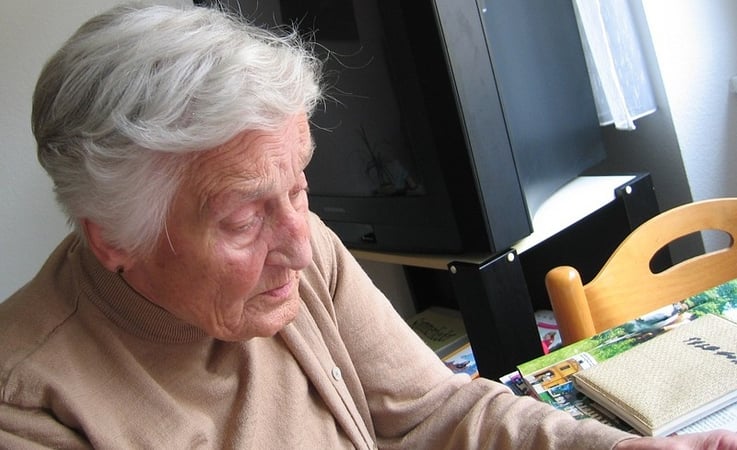
In a 48-week study, an open-label, flexible dose of risperidone was administered for 16 weeks to 180 patients with a diagnosis of Alzheimer’s dementia with agitation and/or aggression. The patients in the study had a mean age of 79 years at baseline. Patients were moderately impaired with a mean mini mental state exam of 14.
Per Anjali Patel, D.O., “I think the clinical impact we see here is that for patients with hallucinations and particularly auditory hallucinations, antipsychotic discontinuation should be done very, very cautiously because they do have a very high risk of relapse. Close monitoring will be necessary and antipsychotic medications promptly reinstated if relapse occurs.” The risk for relapse was particularly high when the hallucinations were primarily auditory. In fact, visual hallucinations were not predictive of relapse.
Caring for Alzheimer's Residents
So what does this mean to us, the caregivers for residents with a diagnosis of Alzheimer’s disease? Well, we know many things and there are many things we don’t know. The disease process is unrelenting, behaviors are very common, and treatment modalities may vary widely depending on the response of the resident.
In some settings, medications are the first line of treatment. Unfortunately, medications are often laden with side effects and may actually cause new and different behaviors to be exhibited. If you have a resident who needs medications such as Risperdal, take note of the findings of the study. It may be easier to explore other options before initiating medications that may not be easily titrated or discontinued in the future. So, let’s talk about it!
The Stress of Change
One thing to remember is that events or changes in a resident’s surroundings often play a role in triggering behavioral symptoms. Change can be stressful for anyone, but can be especially difficult for someone with a diagnosis of Alzheimer’s. Change can increase fear and fatigue due to the resident trying to make sense out of an increasingly confusing world. Situations that may contribute to affecting behaviors include:
- Moving from one room or unit to another in a community
- Changing roommates
- Changes in a familiar environment or caregiver arrangements (consistent caregivers)
- Misperceived threats
- Admission to a hospital
- Being asked to participate in ADL cares such as changing clothes or bathing
Best Practices for Caring for Residents with Alzheimer's
Although many centers have identified successful programming that assists in managing behaviors, this is a process that takes time to develop. Here are a few ideas to think about when working on developing your successful non-drug treatment program:
- Recognize that the person is not just "acting mean” but is having increasing symptoms of a debilitating disease
- Identify the cause of the behavior (root cause analysis) and how the symptom may relate to the experience of the person with Alzheimer's
- Change the environment to resolve challenges and obstacles to comfort, security, and ease of mind
- Monitor personal comfort. Assess for pain, hunger, thirst, constipation, full bladder, fatigue, infection, and skin irritation. Maintain a comfortable room temperature.
- Avoid being confrontational or arguing about facts. If a resident expresses a wish to go visit a parent who died years ago, don’t point out that the parent is dead.
- Redirect the person’s attention; try to remain flexible and patient and supportive by responding to the emotion, not the behavior
- Create a calm environment; avoid noise, glare, insecure space, and too much background distraction—including the use of televisions and radios
- Allow adequate rest periods between stimulating events
- Provide a security object (i.e., baby doll, blanket, etc.)
- Acknowledge requests and respond to them in a timely manner
- Look for reasons behind each unexpected behavior. Consult a physician to identify any causes related to medications or illness.
- Explore various solutions that may include the introduction of medications if necessary
Tools for Preventing Negative Outcomes
Identifying what has triggered a behavior can often help in selecting the best approach to preventing negative outcomes. This may be a daunting task when you have a memory care unit with 20 residents exhibiting antisocial behaviors!
There are many ways senior care communities manage this process, including the tedious task of manually tracking and trending or purchasing expensive software that's quickly outdated or is incompatible with your electronic health record.
Good news! There's an inexpensive, quality option designed to assist in the process of trending, tracking, and root cause analysis! QA Reader is a web-based incident tracking dashboard that can provide your team with real-time resident, unit, and facility-specific reports. QA Reader requires no software investment AND no additional data entry—just a click of the button to upload your incident report!
As a bonus, for no additional charge, an Evolucent risk manager will provide real-time feedback and recommendations for all triggered events! Think of the time your team is spending on data entry, trending, and identifying new interventions. Couldn't this time be better spent addressing resident behaviors? Absolutely!
Next Steps
- Join our upcoming webinar on root cause analysis
- Get a customized QA Reader demo
- Have questions? Let's talk!

